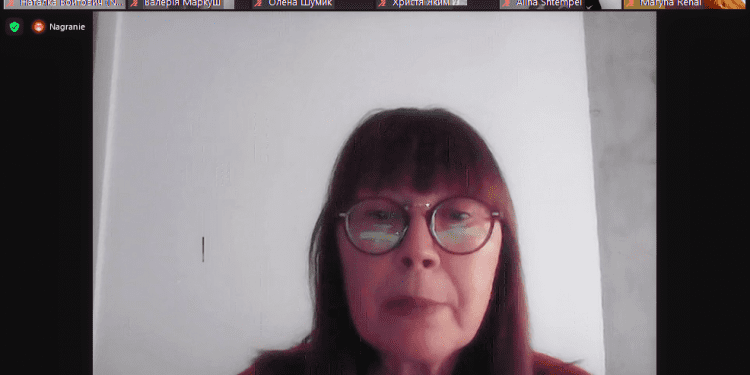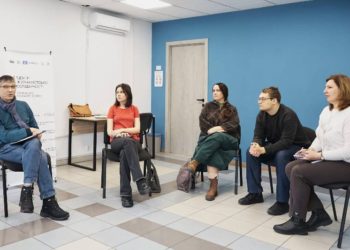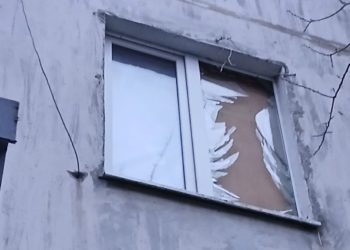Why does the topic of sexual violence become relevant in the context of war? Why are people who have experienced sexual violence during war silent, and how to talk to victims of sexual violence?
Ukrainian journalist Liudmyla Makei covered these topics during the webinar called Sexual Violence Related To The Conflict, which took place at the Journalists’ Solidarity Center (JSC) of the National Union of Journalists of Ukraine (NUJU) in Lviv.
In Ukraine and other countries where sexual violence occurred during the military conflict, this topic was usually kept quiet. There was a culture of silence, and this caused the suffering of people who had been sexually assaulted to increase. They could not ask for help and count on support from their loved ones, so this. to some extent, formed the culture of violence in the post-war period. If the crime is not punished, society defaults to the opinion that it is possible to continue doing so.
Liudmyla Makei gave an example of her last year’s business trip to Bosnia and Herzegovina, where she studied the topic of sexual violence during the war and had the opportunity to communicate with people who work in public and state institutions in this direction.
“More than 30 years have passed since then, and a whole generation of new people was born, but they are still ashamed to talk about their traumatic experience because the men who were their abusers remain in the neighboring country in high positions, work in political parties, and also have inviolability. If the victims had started talking about it in time, perhaps more people would have been punished for sexual crimes during the war, the journalist said.
In Kosovo, at least 20,000 women and men suffered from sexual violence and only two cases where the perpetrators were punished by international justice. This is due to the fact that people constantly kept silent about the problem and did not form public opinion.
Therefore, journalists now have an extremely important mission – to push and make this topic visible, to define priorities: human dignity and the value of human life. This is what motivates us to write about the topic of sexual violence and to do it correctly. While in Ukraine, the topic is actually closed and taboo, we should talk about society’s responsibility towards people who have experienced sexual violence. We should give hope and talk about organizations, institutions, and people who are ready to help. When they start to trust us, they will start coming to us.
Liudmyla Makei shared her recommendations on how to prepare for an interview and cover the topic of sexual violence during conflicts:
First, you need to consult with psychologists who will tell the story of the victim you are going to meet.
They will talk about different story triggers. You will learn what can be a special moment that triggers re-traumatization when a person begins to react too sharply to certain questions.
It is necessary to study psychological personalities
Experienced sexual trauma remains with a person forever if it is not worked through. Even after many years, unexpected circumstances, sounds, smells, and the play of light can provoke a new attack on these painful memories.
Safety is above everything else
When you go to a meeting with a person who will entrust you with their story, you need to realize that you are responsible and should not harm them. It is impossible to give out private data, tell something unnecessary, or hurt the victim again.
Do not wear make-up, bright jewelry, use perfume, etc.
It is necessary to look very simple because women who have survived sexual violence, as a rule, consider themselves to blame for what happened. They can no longer afford to look pretty and attractive, apply their lips, or wear a necklace because it all reminds them of the traumatic experience.
Cover the topic now
Sexual crimes have no statute of limitations. It is necessary to write because every journalistic material will be evidence of a criminal offense, which will then help to punish the guilty.
Talk about the fact that rape is a weapon of war when planning your content. Also, please note that in Ukraine, there is still no such article of legislation that could punish a criminal for a sexual crime.
We have Article 438, but it is necessary to change the provisions of the legislation and facilitate the consideration of cases of civilian rape survivors.
Call Lviv JSC at 097 907 9702 (Nataliya Voitovych, the Lviv JSC). The Center’s address is 5 Solomiyi Krushelnytskoyi Street.
ABOUT JSC
The Journalists’ Solidarity Centers is an initiative of the NUJU implemented with the support of the International and European Federations of Journalists and UNESCO. The initiative is designated to help media representatives working in Ukraine during the war. The Centers operate in Kyiv, Lviv, Ivano-Frankivsk, Chernivtsi, Zaporizhzhia, and Dnipro and provide journalists with organizational, technical, legal, psychological, and other types of assistance.
ABOUT UNESCO
UNESCO is the United Nations Educational, Scientific, and Cultural Organization. It contributes to peace and security by promoting international cooperation in education, sciences, culture, communication, and information. UNESCO promotes knowledge sharing and the free flow of ideas to accelerate mutual understanding. It is the coordinator of the UN Action Plan on the Safety of Journalists and the Issue of Impunity, which aims to create a free and safe environment for journalists and media workers, thus strengthening peace, democracy, and sustainable development worldwide. UNESCO is working closely with its partner organizations in Ukraine to provide support to journalists on the ground.
The designations employed and the presentation of material throughout this digest do not imply the expression of any opinion whatsoever on the part of UNESCO concerning the legal status of any country, territory, city, or area or its authorities or concerning the delimitation of its frontiers or boundaries.
The authors are responsible for the choice and the presentation of the facts contained in this digest and for the opinions expressed therein, which are not necessarily those of UNESCO and do not commit to the organization.
Olena Shumyk

 THE NATIONAL UNION OF
JOURNALISTS OF UKRAINE
THE NATIONAL UNION OF
JOURNALISTS OF UKRAINE
















Discussion about this post